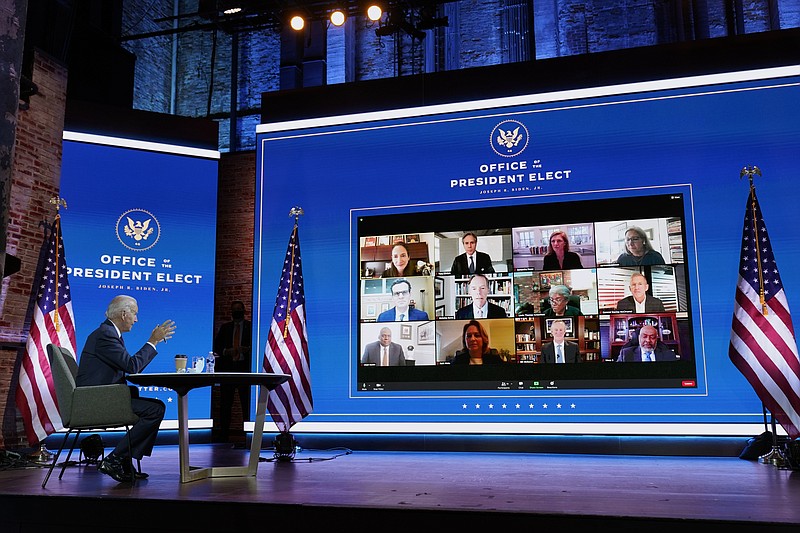WILMINGTON, Del. (AP) - President Donald Trump's refusal to cooperate with his successor is forcing President-elect Joe Biden to seek unusual workarounds to prepare for the public health threat and evolving national security challenges he will inherit in just nine weeks.
Blocked from the official intelligence briefing traditionally afforded to incoming presidents, Biden gathered virtually Tuesday with a collection of intelligence, defense and diplomatic experts. None of the experts are currently affiliated with the U.S. government, raising questions about whether Biden is being provided the most up-to-date information about dangers facing the nation.
Vice President-elect Kamala Harris received a more formal briefing Tuesday as a member of the Senate Intelligence Committee, though she still has relatively limited information about the specific threats Biden will inherit.
And as the worst pandemic in a century bears down on the U.S. with renewed ferocity, the current administration is blocking Biden from collaborating with its response team. Biden's representatives instead plan to meet directly with pharmaceutical companies this week to determine how best to distribute at least two promising vaccines to hundreds of millions of Americans, the biggest logistical challenge to face a new president in generations.
The moves reflect how Biden is adjusting to a tense transition. With no sign Trump is prepared to soon facilitate a peaceful transfer of power, Biden and his team are instead working through a series of backup options to do the best they can to prepare for the challenges he will face as soon as he takes office in January.
Declining to criticize Trump, Biden acknowledged Tuesday he has "not been receiving briefings that would ordinarily come by now" as he opened his virtual meeting with the national security experts. The 12 participants, who appeared on video screens, included former Deputy CIA Director David Cohen, retired Gen. Stanley McChrystal and Avril Haines, a deputy national security adviser in the Obama administration, among others.
Biden said he was preparing to inherit "a divided country and a world in disarray."
"That's why I need you all," he said.
Two weeks after the election, Trump continues to block Biden's access to his administration's pandemic and national security briefings, claiming Biden is not the legitimate president-elect because of non-existent voter fraud.
A study released on Tuesday by the Center for Presidential Transition at the nonpartisan Partnership for Public Service warned an abbreviated transition could impair Biden's ability to fill the more than 1,200 administration jobs requiring Senate confirmation, including key Cabinet and sub-Cabinet posts on the front lines of addressing the pandemic.
A growing group of Republicans have begun to state publicly what Trump will not: Biden will become the next president Jan. 20. Israeli Prime Minister Benjamin Netanyahu referred to Biden as the American "president-elect" for the first time Tuesday.
"He isn't getting the briefings that the president-elect should be getting, but that's not going to stop him from doing everything he can to prepare and execute during this transition period," Biden transition spokesman T.J. Ducklo said.
Trump's decision to block the transfer of power has forced Biden to navigate the business of vaccine distribution with limited information.
Biden's team plans to meet with private pharmaceutical companies on its own in the coming days to learn more about the status of their vaccine production. While neither of the two most promising vaccines has yet earned U.S. government approval, they would almost certainly be distributed under Biden's watch if and when they are formally deemed safe.
Currently, under the Trump administration, the Department of Health and Human Services and the Pentagon are working in conjunction with states on a vaccine distribution plan. However, the Biden transition team and Democrats in Congress also have ideas. There could be conflicting expectations for state leaders and health care systems, which will be closest to the actual work of putting shots into the arms of Americans.
Biden warned Monday "more people may die" if Trump continues to block his access to vaccine distribution plans and pandemic data.
"I'm very concerned that we're in the middle of this battle with people dying and hospitals overflowing in every state in the country, and we have to make sure that there's a smooth handoff," Maryland Gov. Larry Hogan, a Republican who has criticized Trump, told reporters Tuesday. "I'm hopeful that we will, and I think it's getting better, but we have a brand new team that has not been involved that doesn't really know much about what's currently happening, and that's a problem."

